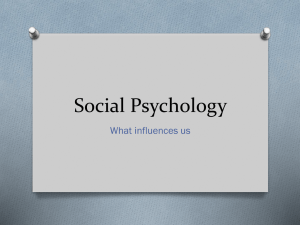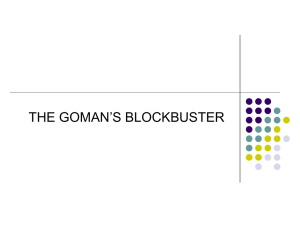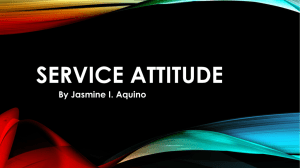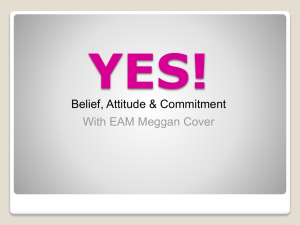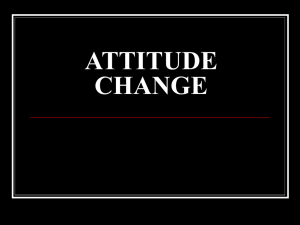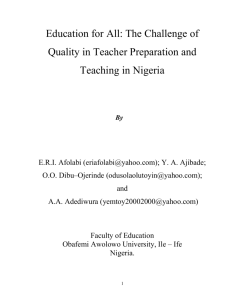Attitude Change
advertisement
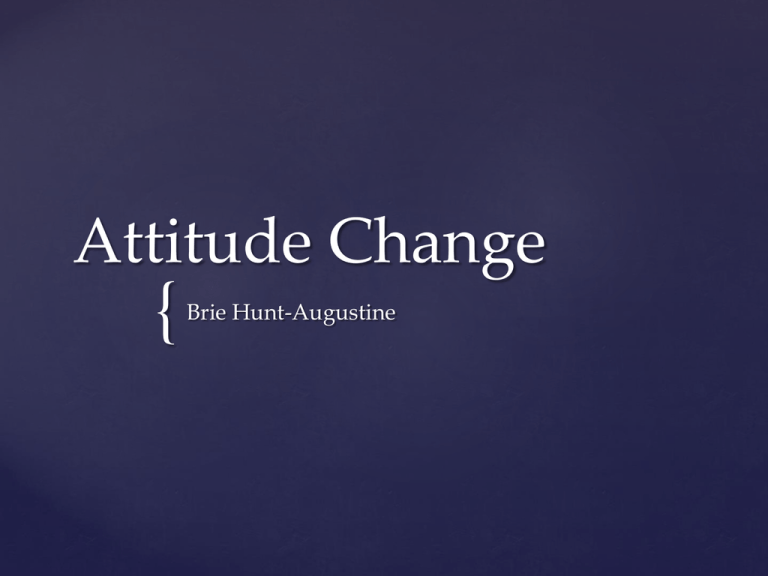
Attitude Change
{
Brie Hunt-Augustine
The Current Issue
Attitude
1.manner, disposition, feeling,
position, etc., with regard to a
person or thing; tendency or
orientation, especially of the
mind: a negative attitude,
group attitudes.
http://dictionary.reference.com/browse/attitude
The Research
Deliberation in Small Face-to-Face
Groups
Previous Research – Can result in a change in
political views
Present Research – “One common impact of
group deliberation is an increase in the
differentiation of liberal and conservative
attitudes (p.26).”
“Moderates showed some resilience in being
unmoved in their attitudes by the average
ideological score . . . They did, however, tend to
move left when a higher proportion of group
members were liberal (p.33).”
Gastil, J., Black, L., & Moscovitz, K. (2008). Ideology, Attitude Change, and Deliberation in Small Face – to – Face Groups. Political Communication, 25:2346.
The Effect of Teaching and Contact on
Attitudes Change
Focus of Research – To evaluate “the effectiveness
of teaching and contact on changing nursing
students attitudes about mental illness.”
Results
– No significant correlation found between attitudes
and demographics
- Individuals with previous experience held
significantly different attitudes.
- The educational course positively changed student’s
attitudes
Hamaideh, S. H., Mudallal, R. (Unknown). Attitudes of Jordanian Nursing Students Towards Mental Illnes: The Effect of Teaching and Contact
on Attitudes Change. College Student Journal, 335-344.
The Influence of Positive and Negative
Affectivity on Attitude Change Toward
Organizations
“ [This research] Test[ed] hypothesized
differences in Pre-post crisis attitude change
toward an organization for positively and
negatively oriented individuals (p.151).”
Unfortunately . . . “The results did not produce
any significant relationship between
dispositional personality variables and attitude
change (p.157).”
“Therefore, it appears that negatively or
positively oriented individuals did not differ
significantly in their attitude changes (p.157).”
Siomkos, G. J., Rao, S. S., & Narayanan, S. (2001). Journal of Business and Psychology, 16, 151-160.
The Effect of Reference Groups, Opinion
Polls, and Attitude Polarization on
Attitude Formation and Change
Utilized “Shibutani’s definition of reference groups as a
framework . . . Reference group is conceptually defined as a
psychological group whose norms, to some degree,
constitute the social frame of reference for an individual
(p.311).”
The researchers, “ examined the polarization factor from the
premise that the less polarized . . . an attitude is, the greater
will be the influence of an appropriate reference group
(p.313).”
“The results indicate that providing individuals with
information concerning the norms of an appropriate
reference group can alter opinions even when the
information is arbitrary or incorrect (p.319).”
Hall, R. G., Varca, P. E., & Fisher, T. D. (1986). The Effect of Reference Groups, Opinion Polls, and Attitude Polarization on Attitude Formation and
Change. Political Psychology, 7, 309-320.
ATTITUDE CHANGE: Persuasion and
Social Influence
Focus: a chapter reviewing “empirical and theoretical
developments in research on social influence and messagebased persuasion.”
Highlights of the Literature
- “When participants were motivated to convey a favorable
impression . . . They selected arguments that were congruent
with the view held by the partner (p.541).”
- “When participants were motivated to defend their own
position, they selected arguments to read that supported
their view (p.541).”
- Ingroup/Outgroup “When people categorize themselves as
an ingroup member, the ingroup served as a reference . . .
And people adopt the prototypic ingroup attitudes and
beliefs as their own (p.557).”
Wood, W. (2000). ATTITUDE CHANGE: Persuasion and Social Influence. Annual Review of Psychology, 51, 539-561.
Influence: A Study of the Factors
Influencing Education Policy
Profiles of Influential People
Bill Gates
George Bush
Edward Kennedy
Bill Clinton
Swanson, C. B. & Barlage, J. (2006). Influence: A Study of the Factors Influencing Education Policy. Editorial Projects in Education Research Center.
Implications for
Practice
Strategies for Successful Promotion of
Democratic Policies & Beliefs
I.
II.
III.
IV.
Moderates should be influenced by utilizing small
group discussions with Democratic representatives.
Do not base canvassing efforts on predictably left
leaning demographic groups – utilize educational,
informational presentations when possible.
Present factual and persuasive surveys to enforce the
norms of our party.
Form an ingroup that includes and encourages the
participation of right and moderately leaning citizens,
and find a shared meaning for the group that bridges
the divide between Democrats and Republicans.
Questions?

